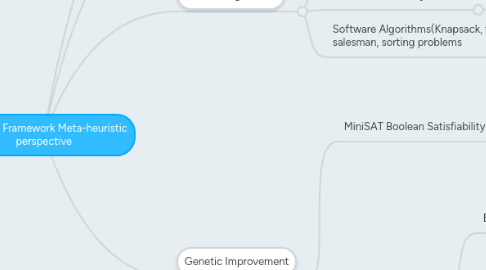
1. Genetic Improvement
1.1. MiniSAT Boolean Satisfiability solver
1.1.1. Energy Consumption
1.1.1.1. C: Connection between source code and the energy consumed during project compilation [P5].
1.1.1.1.1. AS: Simulation can partly address this issue.
1.1.1.2. C: Capturing the energy consumed outside the CPU proves to be challenging [P5].
1.1.1.2.1. AS: Simulation can partly address this issue.
1.2. Software systems
1.2.1. Energy Consumption
1.2.1.1. C: While Using the GIGI4 framework finding other factors that affect the energy consumption and their relative contribution is a challenge [P6].
1.2.1.1.1. AS: The energy consumption equation should be formulated inclusive of the parameters that determine the way the devices are used [P6].
1.2.2. Energy Consumption,Speed, Memory
1.2.2.1. C: Processor is highly susceptible to compiler generated errors [P7].
1.2.2.1.1. AS: Issue could be overcome by involving a penalty and then stopping the program from going to next iteration [P7]
1.2.2.2. C: Finding an effective fitness function by preserving the core functionality of the system is challenging [P7].
1.2.2.2.1. AS: Finding the right metrics and combining them effectively needs to be done to formulate an efficient fitness function.
1.3. Randomised algorithms
1.3.1. Self-stabilization time, fairness, service time
1.3.1.1. C: When using model checking verifying properties of larger systems is very expensive as the number of states grow exponentially with the problem size [P9].
1.3.1.1.1. AS: Always select a subset of the non-functional property set for the optimization
2. Genetic Algorithms
2.1. Cloud Systems(cloud service composition problem)
2.1.1. Performance, time, cost, reliability,
2.2. Service-oriented systems
2.2.1. Performance
2.3. Software Algorithms(Knapsack, travelling salesman, sorting problems
2.3.1. Algorithm performance.
3. Tabu Search
3.1. Mobile Applications
3.1.1. QoS/ Quality of Information
4. Multi-Objective Genetic algorithms
4.1. Systems developed using JAVA [p2]
4.1.1. Reliability, performance, Quality of Service (QoS)
4.1.1.1. T1: EvoChecker

